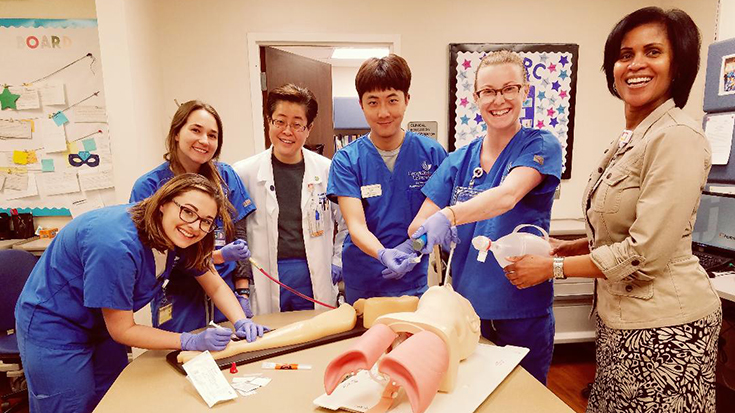
You’ve earned your bachelor’s degree, now what? Earning your degree is a tremendous achievement and testament to the investment you’ve put into your own professional development and dedication you’ve given to the RT profession. We asked two respiratory care managers to share what they look for and expect from RTs who have earned their BSRT.
Don’t wait for graduation
“You’ve dreamed and planned for your career as a Respiratory Therapist. You’re working hard on that goal and the big day is rapidly approaching,” said Valerie David, MHA, RRT, RRT-NPS, AE-C, clinical manager for respiratory care services at Piedmont Hospital. “But don’t wait until you graduate to take steps toward making a smooth transition. Now is the time to start building a great foundation in Respiratory Care.”
David offers a few tips BSRT students can start doing now:
- Take advantage of your externship and get to know the department team and culture.
- Be proactive with your hands-on experience. Look for opportunities to observe, assist with, or perform procedures under the watchful eye of an instructor or preceptor. The more practice and exposure you get as a student, the more confident you will be as a graduate therapist. And it’s always better to do things several times with a pro at your side before you must do it on your own.
- It’s never too soon to start building and maintaining professional relationships. There is an expression that no one succeeds alone and that certainly applies to respiratory therapy. There is help and support all around you if you know where to look.
At Piedmont Atlanta, they often have students. David has been impressed with their “recent externs and their enthusiasm to ask questions.” For David, this display of enthusiasm shows her that the students have “a real genuine interest of being a part of” the organization.
Collaborate effectively
For Cheryl Hoerr, MBA, RRT, CPFT, FAARC, the director of respiratory and sleep services at Phelps County Regional Medical Center, a new BSRT graduate has powerful tools at her/his disposal that can benefit the therapist, the department, and the patients. These tools include an in-depth knowledge and understanding of evidence-based practice standards, respiratory protocol implementation and use, research basics, and critical thinking skills.
According to Hoerr, these tools “can be huge game-changers for RT departments struggling with ways to improve the quality and safety of the care they provide, as well as proving that the care provided by the RTs is effective and contributes to better outcomes for the patient.”
“It’s up to the new BSRT to be that fresh set of eyes and critically evaluate the processes currently in use, and use her/his knowledge to suggest more efficient and effective ways to improve patient outcomes and streamline departmental operations,” said Hoerr.
Hoerr recounted a time when she worked with an RT with excellent clinical and interpersonal skills who decided to pursue a BSRT.
“As a result, she was eventually given the responsibility of overseeing the pulmonary diagnostics center with both RTs and RNs reporting to her,” Hoerr said. “She collaborated closely with her physician staff to improve services and increase patient volumes. Needless to say, her organization and her patients benefitted tremendously from her efforts.”
According to David, respiratory therapists envision themselves as lifelong learners and actively seek socially-oriented learning activities. This includes, exchanging, sharing, and confirming knowledge with co-workers.
Share what you know
Hoerr says she would expect any new BSRT graduate she’s hired to share their knowledge with their coworkers.
“Talk about the latest evidence that supports (or doesn’t support what we are doing), start a journal club to discuss what’s new and keep the staff therapists informed, evaluate our policies and processes and suggest possible improvements,” Hoerr said. “They can also represent the department’s interests at interdisciplinary and organizational meetings.”
Through the BSRT program, students learn to better advance their communication skills, which is useful for interacting with other members of the healthcare team.
“Solid clinical skills combined with effective communication often serves to improve the RT department’s reputation within the care team,” Hoerr said.
Hoerr also offered the following list of tips for BSRT graduates:
- Be a patient advocate and ensure patients are educated about their disease and know how to care for themselves once they are discharged from the hospital.
- Be a role model for other therapists within the department and be willing to share your knowledge.
- Use evidence to justify the use of effective therapies; resist the use of “personal opinion” or bad science as persuasions to administer useless therapy.
- Pass it on: be a preceptor to new students in their clinical rotations.
- Assist department leadership in focusing on improving outcomes for patient care and departmental quality.
- Be an outspoken advocate for the profession of Respiratory Care and a member of your state society and the AARC (and convince your co-workers to support their professional organizations too!)
- Get involved
Be ready for change
Integrity, ambition, and drive top David’s list of expectations from new BSRT grads.
“Skills and aptitude are very close behind,” David said. “In today’s healthcare environment graduates need to have resilience and adaptability.”
For example, IPPB was the standard of care for post-operative pulmonary patients, now, PEP therapy is the primary standard.
“New graduates need to be resilient to change and adaptable to what is thrown at them,” David said. “We live in an environment that is driven by metrics, patient satisfaction, and reducing hospital acquired infections. The new graduate will need to be prepared for what they will face in an increasingly changing environment.”